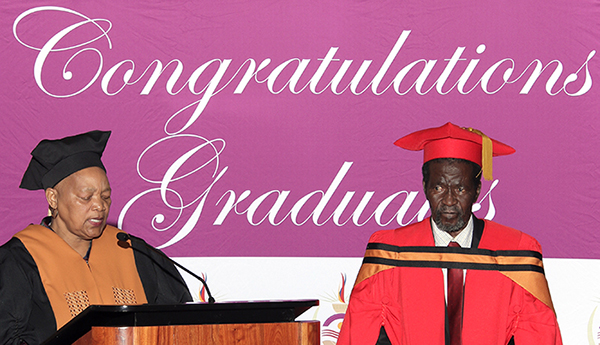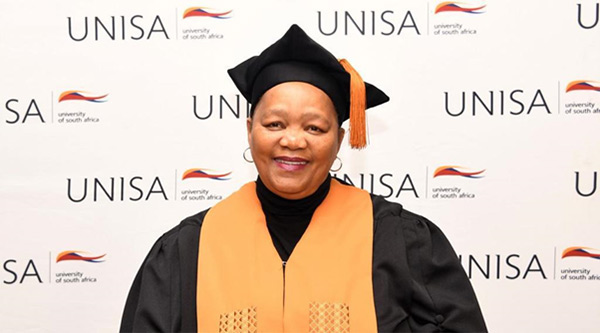
Humbled and grateful to have received a B1-rating by the National Research Foundation (NRF), Professor Jimi Adesina, DSI/NRF SARChI Chair in Social Policy at Unisa’s College of Graduate Studies (CGS), remarks that the rating validates his commitment to enhance African ontology in his scholarship. “I am appreciative to my teachers and mentors who shaped my intellectual orientation, offered a guardrail and inspired my academic journey,” he says.

Professor Jimi Adesina
On 21 April 2023, Unisa presented its 12th annual Research and Innovation (R&I) Awards in recognition of more than 100 exceptional academics who exemplified African research excellence in 2021/2022. The B1-rating that Adesina received confirms that he enjoys international recognition for the high quality and impact of his recent research outputs; therefore, is considered a globally renowned scholar in his field.
Sharing his sentiments about the rating, he says: “In a context where Africa’s postcolonial experience is maligned, I am grateful to the independence struggle generation, both political and intellectual.” He elaborates: “Their determination afforded me an education that was a seamless continuation of the learning I received from my grandmother.” Appropriately, Adesina proclaims that he is confident to approach every intellectual narrative and theory from an African viewpoint.
Impacting people’s lives through research
Adesina started his journey in labour studies, and his father was a union activist. “I was drawn to an intellectual orientation that was committed to the emancipatory project,” he explains. According to him, the African context awareness where most of the population is outside formal employment, shifted his academic orientation from labour and development studies to social policy studies. Adesina remarks: “The firm belief that my work should be meaningful to ordinary people’s lives has been a driving force in my scholarship.”
Adesina notes that his research focus has largely been on social policy, with an insistence on validating African experiences and aspirations. “Additionally,” he continues, “I have been focusing on the importance of African episteme and ontological narratives for an endogenously grounded sociology in the African context. They both converge in our insistence on social policy, scholarship and public policy that is anchored on the African condition.”
For him, the conceptual articulation of Africa-centred social policy has been anchored on the transformative social policy framework that considers human wellbeing in wider terms and set of policy instruments in its pursuit. Adesina says that the works of the late Professor Thandika Mkandawire inspired his framework. He states: “The structural transformation imperative of our economies, social institutions, and social relations invites fidelity to a social policy approach that is focused on development and African agency.”
“I acknowledge the contributions of researchers, alumni, and post-doctoral fellows, among others, that I have worked with at the SARChI Chair in Social Policy,” says Adesina. He adds: “Together we have deepened the value of a transformative approach to social policy, and demonstrated the relevance of an expanded set of policy options, including land and agrarian reform, to its wider vision.” He continues: “We have also insisted on an Africa-focused and African-driven approach to social policy framework that improves human wellbeing.”
Adesina also thanks the South African Sociological Association for honouring him with a Lifetime Achievement Award in 2022, for his contributions to the discipline and association. He says that he also acknowledges the support of his colleagues at CGS, and the leadership of the Research and Innovation Portfolio at Unisa. He concludes: “They continue to provide a conducive working environment for the SARChI Chair in Social Policy.”
* By Nancy Legodi, Acting Senior Journalist, Department of Institutional Advancement
Publish date: 2023/05/08
 Unisa empowers award-winning agro-cosmetics entrepreneur
Unisa empowers award-winning agro-cosmetics entrepreneur
 Unisa initiative offers early-career academics "a stepping stone towards greatness"
Unisa initiative offers early-career academics "a stepping stone towards greatness"
 Seasoned meteorologist joins Unisa
Seasoned meteorologist joins Unisa
 Unisa celebrates the 2023 and 2024 Hiddingh-Currie Award winners
Unisa celebrates the 2023 and 2024 Hiddingh-Currie Award winners
 Unisa celebrates a project of hope, dignity and student success
Unisa celebrates a project of hope, dignity and student success